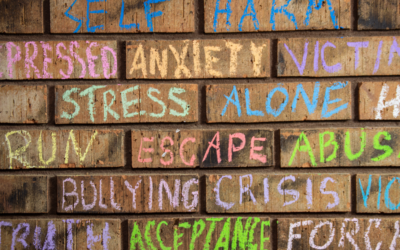Obsessive-Compulsive Disorder (OCD) is a mental health condition that affects many people but is often misunderstood. In this blog post, we’ll take a closer look at OCD and try to clear up some misconceptions people might have. We’ll talk about what OCD is, what can cause it, and how it can affect people’s lives. We’ll also discuss some of the challenges people with OCD might face and offer support to anyone struggling with this condition. Our goal is to help more people understand OCD, reduce its stigma, and provide resources for those who need them.
What is Obsessive-Compulsive Disorder?
Millions of people worldwide suffer from a mental health condition called Obsessive-Compulsive Disorder (OCD). It’s a disorder that causes persistent, unwanted thoughts leading to distress and anxiety. These thoughts are often irrational and illogical, making people feel embarrassed or ashamed. People with OCD feel a strong urge to perform repeated behaviors or mental acts, which can be time-consuming and interfere with their daily lives. This makes it difficult for them to lead a fulfilling life.
Besides thinking about unwanted thoughts and repetitive behaviors, people with OCD might also suffer from other mental health issues, such as anxiety or depression. These conditions can make their OCD symptoms worse, making them even more challenging to cope with. Therefore, it’s crucial to seek professional help if you’re struggling with OCD since it can significantly affect your daily life.
Key Features of OCD:
Diverse Obsessions:
People with OCD can experience different types of obsessions and compulsions. Some people may fear germs and dirt causing them to wash their hands excessively or avoid touching things or people. Others may worry about leaving doors unlocked or appliances on and will repeatedly check them, even if there’s no need. Some people may have a strong need for things to be perfectly aligned and symmetrical, while others may have disturbing thoughts about causing harm to themselves or others. Some people may have thoughts that conflict with their religious beliefs, while others may have inappropriate and unwanted sexual thoughts. Lastly, some people may have difficulty getting rid of items, even those with no value, and collect things to the point of clutter, making their living spaces unusable.
Multifaceted Compulsions:
Another symptom of OCD is that it makes people feel pressured to do certain things repeatedly to get rid of their worries or prevent something bad from happening. This can be things like washing their hands a lot, checking if doors are locked, counting things repeatedly, or organizing objects in a specific way. These behaviors can take up a lot of time and can make it hard to do everyday activities. People do these things because it makes them feel better temporarily, but the relief doesn’t last long, and the problem can return.
Time-Consuming:
People with OCD often need to repeat certain actions or routines in response to their distressing thoughts or fears. This can take up a lot of their time, making it difficult to focus on other tasks or enjoy life. For example, they may need to wash their hands repeatedly, check locks excessively, or organize things in specific ways. They may also avoid certain situations or tasks that trigger their obsessions, making it hard to plan their day or accomplish other goals. This can be emotionally exhausting and limit their ability to participate in enjoyable activities or meet responsibilities at work or school. OCD can disrupt a person’s daily life, making it hard to be productive or maintain relationships. Overall, it can become a significant part of a person’s day and make it hard to lead a fulfilling life.
Statistics on OCD:
Global Prevalence:
Obsessive-Compulsive Disorder (OCD) is a condition that affects a lot of people all over the world. According to the World Health Organization (WHO), around 1% of people are diagnosed with OCD each year, and about 2% of people experience it at some point. This means that millions of people worldwide struggle with OCD.
Onset Age:
OCD often starts at a young age, mostly during childhood or adolescence. Studies show that about 25% of OCD cases begin by age 14, and almost half by the time people are in their twenties. This early onset of OCD can significantly impact a person’s life, affecting their education, relationships with others, and family life.
Gender Distribution:
OCD affects people of all genders, regardless of whether they are male or female. Studies have shown that both men and women can experience OCD. However, women are three times more likely to experience OCD than men. Knowing that OCD affects both men and women is important because it helps us understand that anyone can experience this condition. Everyone deserves access to the support and resources needed to manage it.
Comorbidity:
It’s common for people with OCD to have other mental health issues. This is called comorbidity. People with OCD are more likely to develop other problems like depression or anxiety. For example, 75% of people with OCD will have a major depressive episode at some point, and almost 80% of people with OCD will also have an anxiety disorder. Having these other problems can make OCD even more challenging to deal with.
Complications of OCD:
Impaired Quality of Life:
Obsessive-Compulsive Disorder (OCD) is a mental health condition that can significantly impact a person’s life. People with OCD have thoughts that they can’t stop, which can be upsetting. They might worry about getting sick, hurting themselves or others, or organizing things perfectly. To try and feel better, people with OCD might do things repeatedly, like washing their hands or checking things multiple times. These behaviors can take up a lot of time and make it hard to do everyday things like school, work, or hanging out with friends. In some cases, OCD can lead to other mental health problems like feeling sad or worried all the time.
Coexisting Conditions:
It’s not uncommon for people with Obsessive-Compulsive Disorder (OCD) to experience other mental health issues, like depression and anxiety. This can make figuring out what’s happening and finding the proper treatment challenging. Depression can make you feel even more hopeless, while anxiety can worsen your obsessive thoughts and compulsive behaviors. Getting help for multiple conditions might mean trying different things, like medication, therapy, and changes to your lifestyle. It’s important to talk to a professional and work together to come up with a plan that works for you and addresses all your symptoms.
Isolation:
Many people with OCD feel ashamed and embarrassed about their condition, which can lead them to avoid social situations. This can make it even harder for them to connect with others and can worsen their symptoms. People with OCD need to seek support and not let their condition limit their interactions with the world around them.
Substance Abuse:
For some people with OCD, they may turn to drinking alcohol or using drugs as a way to deal with their symptoms. But this can worsen things and lead to even more severe problems, like addiction, substance abuse, and health issues.
Chronicity:
OCD is a chronic condition that can cause ongoing problems if left untreated. The symptoms can be upsetting and interfere with daily life. Without proper care, the symptoms can worsen over time, making it hard to function in personal and work situations. It’s important to seek help from a mental health professional to manage the symptoms and prevent long-term problems.
Possible Sources of OCD:
Genetics:
Research has discovered that Obsessive-Compulsive Disorder (OCD) has a strong genetic basis. People with a family history of OCD have a higher chance of developing the disorder compared to those without such a history. Having a close relative with OCD increases the risk of developing the disorder up to five times. Additionally, specific genes that may play a role in the onset of OCD have been identified, indicating that genetics may be a crucial factor in the development of the disorder.
Neurobiology:
Research has shown that OCD is related to brain structure and function differences, particularly in regions that manage decision-making and controlling behaviors. These differences can make managing intrusive thoughts and compulsive behaviors, which are hallmark symptoms of OCD, more difficult.
Trauma:
Studies have found that experiencing traumatic events, like physical or sexual abuse, can increase the likelihood of developing obsessive-compulsive disorder (OCD). People who have gone through traumatic experiences may be more prone to having intrusive thoughts or repetitive behaviors to deal with the distress caused by their past experiences.
Infections:
Sometimes, certain kinds of bacteria, called streptococcus, are related to developing OCD-type behaviors. In rare cases, this can lead to PANDAS, which may cause symptoms similar to obsessive-compulsive disorder (OCD). But, not all cases of OCD are caused by this type of bacteria. It’s important to know that PANDAS is a rare condition and speak to a medical provider if you suspect that there may be a bacterial infection present.
Stress:
Dealing with chronic stress or major life changes can be especially difficult for people with OCD. It can worsen their symptoms or even bring on new ones, like intrusive thoughts, repetitive behaviors, or a constant need for control or reassurance. To manage these symptoms and improve their quality of life, people with OCD need to seek professional help and treatment. This can also help them better understand their condition and develop ways to cope with the challenges that come with it.
Coping Strategies
Therapy:
Obsessive-compulsive disorder (OCD) can be treated through various means, among which cognitive-behavioral therapy (CBT) with exposure and response prevention (ERP) is a popular treatment. This treatment involves a trained therapist who helps the person with OCD to understand their thoughts and behaviors. The therapist guides the person through facing their fears and gradually reducing the compulsive behaviors that worsen the condition in the long run.
CBT with ERP is a scientifically proven and effective treatment for OCD. The therapy involves gradual exposure to things that make the person anxious, helping them learn how to cope with their anxiety and resist the urge to do things that temporarily make them feel better but worsen the condition in the long run.
The duration of therapy sessions can vary, but most sessions typically range from 12-20 sessions, depending on the individual’s specific needs. The therapist will work with the person to create a personalized treatment plan considering their unique circumstances and requirements.
CBT with ERP is a safe and effective treatment that has been shown to work for up to 70% of people who try it. This therapy can help people regain control of their lives and find long-lasting relief from their OCD symptoms. It’s a powerful and transformative way to get help.
Medication:
There are medicines called selective serotonin reuptake inhibitors (SSRIs) that can help treat OCD. These medicines work by changing the levels of a chemical called serotonin in the brain. Serotonin helps regulate our mood and how anxious we feel. SSRIs increase the amount of serotonin in the brain, which can help reduce the frequency and intensity of OCD symptoms. SSRIs can take a few weeks to start working and may cause side effects like nausea, trouble sleeping, or problems with sex drive. It’s essential to work with a healthcare provider to find the best treatment plan for managing OCD symptoms.
Lifestyle Changes:
An excellent way to manage OCD symptoms is to care for your mind and body. You can learn relaxation techniques like deep breathing, meditation, and muscle relaxation. Exercise is also a great way to reduce stress and improve your health. You can try activities like jogging, swimming, or yoga. Finally, it’s important to live a healthy lifestyle by getting enough sleep, eating a balanced diet, and avoiding harmful things like alcohol and drugs. All of these things can help you feel better and manage your OCD symptoms.
Support Groups:
People dealing with obsessive-compulsive disorder (OCD) need to connect with others who are going through similar experiences. By sharing their struggles and successes, they can gain emotional support and learn new ways to manage their symptoms. This can be done through support groups, online forums, or even just by talking to someone with OCD. Feeling like part of a community can help individuals feel less isolated and more confident in their journey toward recovery.
Conclusion
Obsessive-Compulsive Disorder is a complex mental health challenge that can significantly impact an individual’s life. Understanding what OCD truly is, addressing potential complications, exploring possible sources of the disorder, and learning about coping strategies are essential to foster compassion and support. By raising awareness and advocating for understanding, we can contribute to a more inclusive and empathetic society for those with OCD. Help and support are available, and you are not alone on this journey. If you or someone you know is struggling with OCD, reach out for assistance – there is hope.










